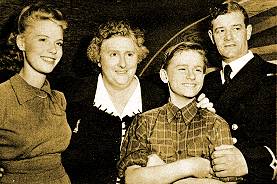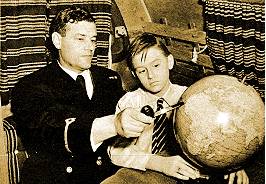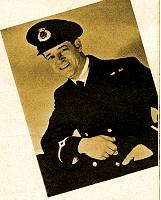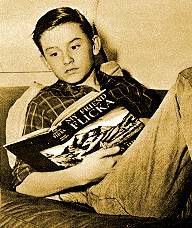An officer from the Scythia told them they could go aboard. The dreaded moment had come. Thomas embraced his wife and daughter. He placed his hands on Roddy's shoulders and looked into his eyes. He didn't speak, but Roddy knew his dad was silently telling him that he was now the head man of the family.
Head of the family! A large order for a thirteen-year-old boy. But somehow, as Roddy told me all this, in the playroom of his California home, I felt he was equal to the job. There is a quiet assurance about him which inspires confidence.
"Were you surprised when your father joined the British Merchant Marine?" I asked.
"Not at all," replied Roddy his eyes sparkling with excitement. "Dad loves the sea. Besides, he belonged to the Merchant Marine in the last war. It was awfully exciting. The ship he was on got torpedoed and the crew had to abandon it. They drifted around in a life-boat for two days before they were picked up. If I were grown-up I'd certainly join the Merchant Marine. They really have adventures!"
"More so than any other service?"
Roddy thought a moment before he replied. "Well, in this war," he explained, "the Merchant Marine seamen are manning the life-lines of the United Nations. You see their ships carry essential supplies. They have to get through at any cost. And it's tough going 'cause they haven't always enough guns to put up a good fight. If an enemy looms on the horizon they just have to outwit them."
"But Roddy," I protested, "if a German bomber swoops down to kill, how can they possibly win the encounter by wits?"
|
"Dad told me they have only one real defense. When the enemy is overhead the thing to do is to keep the ship in a steady course until the plane is in a bombing position. Then you swing the helm hard over so that the ship moves out of the path of the bomb."
As Roddy talked he kept looking at a picture of his father, Thomas McDowall. A fine-looking man in an officer's uniform with eyes as warm and steadfast as those of his son.
"Dad and I used to go sailing all the time before the war," continued Roddy. "He taught me a lot about boats."
There was really no need for Roddy to tell me how interested he is in ships, for his playroom proclaims the fact for him. The chintz drapes and chair slip-covers have a sailboat in their design and the bookcase shelves are lined with books of sea stories. On the wall is a beautifully drawn map of a mythical kingdom Roddy started inventing when he was six. The imaginary country is called Fidelis and Roddy has written several books on its history. For the present he has lost interest in Fidelis because the world right now is much more crammed full of adventure and excitement than Roddy could possibly dream up.
For instance, several months ago an enemy submarine fired at an oil-well on the coast of California. A fan of Roddy's who happened to live in that vicinity sent him a piece of the shrapnel as a souvenir. Roddy now considers this his good luck piece. And well he might, for at about the time the enemy made the surprise attack Thomas McDowall's ship was sailing up the Pacific Coast. Quite unexpectedly good fortune had made it possible for him to see his family again for the first time since they parted two years ago in Liverpool.
|



